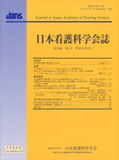Japanese
English
- 販売していません
- Abstract 文献概要
- 参考文献 Reference
要旨
目的:更年期のような人生の過渡期では,自分に降りかかるさまざまな変化に柔軟に対応することが重要と考える.本研究では,flexibility(柔軟性)の概念分析を行い,更年期医療における概念の有効性の検討を目的とした.
方法:2000~2005年の看護学,心理学,社会学,フェミニズムの領域から30文献を便宜的に抽出し,Rodgersのアプローチを参考に概念分析した.
結果:flexibilityの属性は【滑らかで連動した動き】【多様な見解と統合的思考】【状況に応じた敏感な変動】【調整可能】【効率的】が抽出された.先行要因は〔常に変化する環境〕〔両立しがたい2つ以上の要求〕〔不確かさ〕〔変化や多様性を支持する傾向〕が,帰結には<調整範囲が広がる><外部からの衝撃に強くなる><協調性が向上する><思慮深くなる><情緒的に安定する>が抽出された.
結論:更年期女性の健康を促進するケアにおいてflexibilityは重要な概念と考える.
Abstract
During menopause, women experiences major physical changes. There are concurrent psychosocial changes. Both can be stressful. It is thought that a woman's flexibility can help her cope. To better understand the concept of flexibility a concept analysis following the methods of Rodgers was conducted. Thirty publications from nursing, psychology, sociology and feminism during the years 2000 through 2005 were reviewed. Attributes of flexibility were extracted: smooth movement, differentiation and integration, adaptive and sensitive response, adjustment, and efficiency. Antecedents of flexibility were also extracted:constantly changing environments, multiple conflicting demands, uncertainty, and a tendency to support change and diversity. Consequences of flexibility were extracted:extending range of control, resilience to external shock, improving the spirit of cooperation, becoming thoughtful, and maintaining emotional stability. Flexibility is a property concept because it expresses a state. Being flexible can require the capacity of analyze situations and be adaptable to circumstances. Developing these capacities can mitigate the problems of menopause.The results of this analysis will be used to devise nursing interventions to promote healthful flexibility among menopausal women.
Copyright © 2008, Japan Academy of Nursing Science. All rights reserved.


